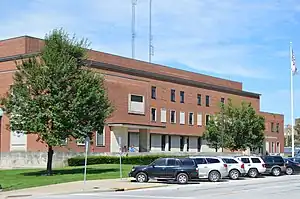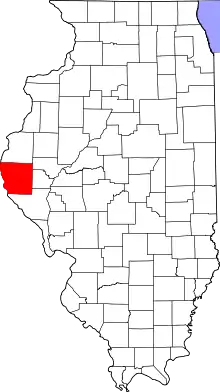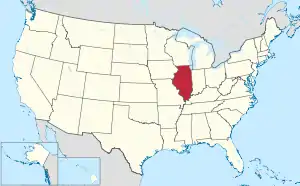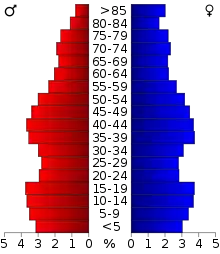Adams County | |
|---|---|
 | |
 Location within the U.S. state of Illinois | |
 Illinois's location within the U.S. | |
| Coordinates: 39°59′N 91°11′W / 39.99°N 91.19°W | |
| Country | |
| State | |
| Founded | 1825 |
| Named for | John Quincy Adams |
| Seat | Quincy |
| Largest city | Quincy |
| Area | |
| • Total | 871 sq mi (2,260 km2) |
| • Land | 855 sq mi (2,210 km2) |
| • Water | 16 sq mi (40 km2) 1.9% |
| Population (2020) | |
| • Total | 65,737 |
| • Density | 75/sq mi (29/km2) |
| Time zone | UTC−6 (Central) |
| • Summer (DST) | UTC−5 (CDT) |
| Congressional district | 15th |
| Website | www |
Adams County is the westernmost county in the U.S. state of Illinois. As of the 2020 census, the population was 65,737.[1] Its county seat is Quincy.[2] Adams County is part of the Quincy, IL–MO Micropolitan Statistical Area.
History
Adams County was formed in 1825 out of Pike County. Its name is in honor of the sixth President of the United States, John Quincy Adams.
 When it was created, Hancock County was temporarily attached to Adams until it could organize a county government.[3]
When it was created, Hancock County was temporarily attached to Adams until it could organize a county government.[3] Adams County reduced to its current borders in 1829.
Adams County reduced to its current borders in 1829.
Geography
| Quincy, Illinois | ||||||||||||||||||||||||||||||||||||||||||||||||||||||||||||
|---|---|---|---|---|---|---|---|---|---|---|---|---|---|---|---|---|---|---|---|---|---|---|---|---|---|---|---|---|---|---|---|---|---|---|---|---|---|---|---|---|---|---|---|---|---|---|---|---|---|---|---|---|---|---|---|---|---|---|---|---|
| Climate chart (explanation) | ||||||||||||||||||||||||||||||||||||||||||||||||||||||||||||
| ||||||||||||||||||||||||||||||||||||||||||||||||||||||||||||
| ||||||||||||||||||||||||||||||||||||||||||||||||||||||||||||
According to the U.S. Census Bureau, the county has a total area of 871 square miles (2,260 km2), of which 855 square miles (2,210 km2) is land and 16 square miles (41 km2) (1.9%) is water.[5]
Adjacent counties
- Hancock County - north
- Brown County - east
- Schuyler County - east
- Pike County - south
- Marion County, Missouri - west
- Lewis County, Missouri - west
Public transit
Major highways
National protected area
Climate and weather
In recent years, average temperatures in the county seat of Quincy have ranged from a low of 16 °F (−9 °C) in January to a high of 88 °F (31 °C) in July, although a record low of −21 °F (−29 °C) was recorded in January 1979 and a record high of 105 °F (41 °C) was recorded in July 2005. Average monthly precipitation ranged from 1.36 inches (35 mm) in January to 4.61 inches (117 mm) in May.[4]
Demographics

| Census | Pop. | Note | %± |
|---|---|---|---|
| 1830 | 2,186 | — | |
| 1840 | 14,476 | 562.2% | |
| 1850 | 26,508 | 83.1% | |
| 1860 | 41,323 | 55.9% | |
| 1870 | 56,362 | 36.4% | |
| 1880 | 59,135 | 4.9% | |
| 1890 | 61,888 | 4.7% | |
| 1900 | 67,058 | 8.4% | |
| 1910 | 64,588 | −3.7% | |
| 1920 | 62,188 | −3.7% | |
| 1930 | 62,784 | 1.0% | |
| 1940 | 65,229 | 3.9% | |
| 1950 | 64,690 | −0.8% | |
| 1960 | 68,467 | 5.8% | |
| 1970 | 70,861 | 3.5% | |
| 1980 | 71,622 | 1.1% | |
| 1990 | 66,090 | −7.7% | |
| 2000 | 68,277 | 3.3% | |
| 2010 | 67,103 | −1.7% | |
| 2020 | 65,737 | −2.0% | |
| U.S. Decennial Census[6] 1790–1960[7] 1900–1990[8] 1990–2000[9] 2010–2013[1] | |||
As of the 2020 United States Census, there were 65,737 people, 27,199 households, and 17,398 families residing in the county.[10] The population density was 75.5 inhabitants per square mile (29.2/km2). There were 30,235 housing units at an average density of 34.7 per square mile (13.4/km2). The racial makeup of the county was 89.5% white, 3.8% black or African American, 0.8% Asian, 0.2% American Indian, 0.8% from other races, and 4.9% from two or more races. Those of Hispanic or Latino origin made up 2.0% of the population. The most common reported ancestries were, German (35.9%), Irish (11.1%), English (8.1%), and American (7.4%).
Of the 27,199 households, 25.1% had children under the age of 18 living with them, 50.2% were married couples living together, 9.8% had a female householder with no husband present, 36.0% were non-families. 30.5% of all households were made up of individuals, and 15.4% had someone living alone who was 65 years of age or older. The average household size was 2.36 and the average family size was 2.95.
In the county, the population was spread out, with 22.6% under the age of 18, 7.5% from 18 to 24, 23.7% from 25 to 44, 25.9% from 45 to 64, and 20.2% who were 65 years of age or older. The median age was 41.4 years. For every 100 females, there were 96.4 males. For every 100 females age 18 and over, there were 93.5 males.
The median income for a household in the county was $55,052 and the median income for a family was $72,091. Males had a median income of $41,852 versus $29,404 for females. The per capita income for the county was $31,035. About 9.4% of families and 12.5% of the population were below the poverty line, including 17.7% of those under age 18 and 9.9% of those age 65 or over.[11]
2020 Census
| Race | Num. | Perc. |
|---|---|---|
| White (NH) | 58,389 | 88.82% |
| Black or African American (NH) | 2,464 | 3.74% |
| Native American (NH) | 92 | 0.14% |
| Asian (NH) | 500 | 0.76% |
| Pacific Islander (NH) | 33 | 0.05% |
| Other/Mixed (NH) | 2,972 | 4.52% |
| Hispanic or Latino | 1,287 | 2% |
Communities

City
- Quincy (seat)
Villages
Unincorporated communities
Townships
Adams County is divided into twenty-three townships:
Politics
| Year | Republican | Democratic | Third party | |||
|---|---|---|---|---|---|---|
| No. | % | No. | % | No. | % | |
| 2020 | 24,220 | 72.24% | 8,633 | 25.75% | 674 | 2.01% |
| 2016 | 22,790 | 70.54% | 7,676 | 23.76% | 1,844 | 5.71% |
| 2012 | 20,416 | 66.51% | 9,648 | 31.43% | 633 | 2.06% |
| 2008 | 18,711 | 60.55% | 11,794 | 38.17% | 397 | 1.28% |
| 2004 | 20,834 | 66.19% | 10,511 | 33.39% | 132 | 0.42% |
| 2000 | 17,331 | 57.56% | 12,197 | 40.51% | 581 | 1.93% |
| 1996 | 13,836 | 48.70% | 11,336 | 39.90% | 3,239 | 11.40% |
| 1992 | 13,529 | 42.84% | 11,748 | 37.20% | 6,302 | 19.96% |
| 1988 | 15,831 | 53.29% | 13,768 | 46.34% | 111 | 0.37% |
| 1984 | 20,225 | 65.99% | 10,336 | 33.72% | 88 | 0.29% |
| 1980 | 19,842 | 62.17% | 10,606 | 33.23% | 1,469 | 4.60% |
| 1976 | 18,189 | 59.67% | 11,926 | 39.12% | 370 | 1.21% |
| 1972 | 20,731 | 69.46% | 9,055 | 30.34% | 60 | 0.20% |
| 1968 | 17,444 | 54.33% | 11,521 | 35.88% | 3,143 | 9.79% |
| 1964 | 13,993 | 43.30% | 18,321 | 56.70% | 0 | 0.00% |
| 1960 | 18,674 | 55.70% | 14,827 | 44.22% | 28 | 0.08% |
| 1956 | 19,569 | 63.12% | 11,402 | 36.78% | 32 | 0.10% |
| 1952 | 19,652 | 59.60% | 13,301 | 40.34% | 21 | 0.06% |
| 1948 | 14,329 | 48.67% | 14,960 | 50.81% | 152 | 0.52% |
| 1944 | 15,564 | 52.87% | 13,733 | 46.65% | 142 | 0.48% |
| 1940 | 18,480 | 50.86% | 17,361 | 47.78% | 492 | 1.35% |
| 1936 | 13,114 | 39.18% | 18,857 | 56.33% | 1,502 | 4.49% |
| 1932 | 10,134 | 32.00% | 21,098 | 66.62% | 437 | 1.38% |
| 1928 | 15,590 | 53.59% | 13,215 | 45.42% | 288 | 0.99% |
| 1924 | 9,985 | 40.92% | 8,628 | 35.35% | 5,791 | 23.73% |
| 1920 | 12,852 | 57.07% | 7,222 | 32.07% | 2,447 | 10.87% |
| 1916 | 11,858 | 44.23% | 14,268 | 53.22% | 682 | 2.54% |
| 1912 | 3,780 | 26.50% | 6,952 | 48.74% | 3,531 | 24.76% |
| 1908 | 7,233 | 44.34% | 8,294 | 50.84% | 787 | 4.82% |
| 1904 | 7,277 | 49.06% | 6,149 | 41.45% | 1,408 | 9.49% |
| 1900 | 8,047 | 46.81% | 8,844 | 51.44% | 301 | 1.75% |
| 1896 | 8,447 | 50.26% | 8,025 | 47.75% | 336 | 2.00% |
| 1892 | 6,081 | 41.98% | 7,746 | 53.48% | 657 | 4.54% |
| Position | Person | Party |
|---|---|---|
| Circuit Clerk | Lori Geschwandner | Democratic |
| County Clerk | Ryan Niekamp | Republican |
| Coroner | Scott Graham | Republican |
| Sheriff | Anthony Grootens | Republican |
| State's Attorney | Gary Farha | Republican |
| Regional Superintendent | Jill Reis | Republican |
| Treasurer | Bryden Cory | Republican |
Adams County, positioned in a primarily rural section of Illinois is culturally isolated from Chicago, and therefore more conservative than the state's northeastern corner. Quincy, the county seat, holds a high number of socially conservative Catholics[14] and likewise is the home to the campus of Quincy University, a private Catholic liberal arts college, and the Western Catholic Union.
The county is part of the historic belt of German settlement extending into the Missouri Rhineland. Since it was antagonistic to the Yankee northeast of Illinois, it voted solidly Democratic until 1892. After being a swing county in the first half of the twentieth century, Adams County has been a Republican stronghold. It has gone Republican in all but four presidential elections since 1920, all but one of which was a 400-vote Democratic landslide. The county last supported a Democrat in 1964, when it voted for Lyndon Johnson. The county regularly supports the Republicans at the state level as well; it has not supported a Democrat for Governor of Illinois since Adlai Stevenson II in 1948. Additionally, five of the six countywide elected officials in Adams County are Republicans, with a Democrat holding the position of Circuit Clerk.[15][16] Notably, while it voted for Barack Obama in his 2004 Senate campaign, he lost it by wide margins in both of his presidential bids.
The county is part of Illinois's 15th congressional district, currently represented by Republican Mary Miller. For the Illinois House of Representatives, the county is located in the 94th district, represented by Republican Randy Frese. The county is located in the 47th district of the Illinois Senate, represented by Republican Jil Tracy.
Education
Unified school districts
Private schools
Colleges and universities
- Blessing-Rieman College of Nursing
- John Wood Community College
- Quincy University
Attractions
- Adams County Fair[23]
- Bayview Bridge
- Burton Cave[24]
- Fall Creek Scenic Park
- Golden Windmill[25]
- John Wood Mansion
- Saukenauk Scout Reservation[26]
- Siloam Springs State Park
- Spirit Knob Winery[27]
- Villa Katharine[28]
- Wavering Park[29]
See also
References
- 1 2 "State & County QuickFacts". United States Census Bureau. Archived from the original on June 6, 2011. Retrieved July 3, 2014.
- ↑ "Find a County". National Association of Counties. Archived from the original on May 31, 2011. Retrieved June 7, 2011.
- ↑ White, Jesse. Origin and Evolution of Illinois Counties. State of Illinois, March 2010. Archived January 9, 2017, at the Wayback Machine
- 1 2 "Monthly Averages for Quincy, Illinois". The Weather Channel. Archived from the original on October 23, 2012. Retrieved January 27, 2011.
- ↑ "Population, Housing Units, Area, and Density: 2010 - County". United States Census Bureau. Archived from the original on February 12, 2020. Retrieved July 11, 2015.
- ↑ "U.S. Decennial Census". United States Census Bureau. Archived from the original on July 17, 2022. Retrieved July 3, 2014.
- ↑ "Historical Census Browser". University of Virginia Library. Archived from the original on May 30, 2019. Retrieved July 3, 2014.
- ↑ "Population of Counties by Decennial Census: 1900 to 1990". United States Census Bureau. Archived from the original on April 24, 2014. Retrieved July 3, 2014.
- ↑ "Census 2000 PHC-T-4. Ranking Tables for Counties: 1990 and 2000" (PDF). United States Census Bureau. Archived (PDF) from the original on December 18, 2014. Retrieved July 3, 2014.
- ↑ "Explore Census Data". data.census.gov. Archived from the original on June 30, 2022. Retrieved June 30, 2022.
- ↑ "DP03 SELECTED ECONOMIC CHARACTERISTICS – 2006-2010 American Community Survey 5-Year Estimates". United States Census Bureau. Archived from the original on February 13, 2020. Retrieved July 11, 2015.
- ↑ "P2 HISPANIC OR LATINO, AND NOT HISPANIC OR LATINO BY RACE – 2020: DEC Redistricting Data (PL 94-171) – Adams County, Illinois". Archived from the original on October 18, 2022. Retrieved October 18, 2022.
- ↑ Leip, David. "Dave Leip's Atlas of U.S. Presidential Elections". uselectionatlas.org. Archived from the original on March 23, 2018. Retrieved October 28, 2018.
- ↑ "Archived copy". Archived from the original on February 13, 2012. Retrieved April 29, 2009.
{{cite web}}: CS1 maint: archived copy as title (link) - ↑ White, Jesse, ed. (2021). "Counties & County Officers". Illinois Blue Book 2021-2022 (PDF). Springfield, Illinois: Illinois Secretary of State. Archived from the original (PDF) on April 4, 2023. Retrieved May 23, 2023.
- ↑ Sorensen, Mike (December 1, 2022). "Three Adams County officials sworn in on Thursday". Herald-Whig. Archived from the original on December 2, 2022. Retrieved May 23, 2023.
- ↑ "Blessed Sacrament Catholic School – Quincy, Illinois – #beasaint". www.blessedscs.org. Archived from the original on June 9, 2023. Retrieved June 27, 2023.
- ↑ "Chaddock | Treatment Services for Struggling Children | Quincy IL". February 13, 2019. Archived from the original on June 27, 2023. Retrieved June 27, 2023.
- ↑ "St. Dominic School". www.stdominicquincy.org. Archived from the original on June 8, 2023. Retrieved June 27, 2023.
- ↑ "Parish Home - St. Francis Solanus - Quincy, IL". stfrancissolanus.com. November 3, 2018. Archived from the original on June 12, 2023. Retrieved June 27, 2023.
- ↑ "St James Lutheran Church and School Quincy, IL". Archived from the original on August 3, 2009.
- ↑ "Home | St.Peter School". stpeterschool.com. May 10, 2016. Archived from the original on May 15, 2023. Retrieved June 27, 2023.
- ↑ "Adams County Fair - Adams County Fair Home". Archived from the original on June 21, 2009.
- ↑ "Burton Cave Nature Preserve Adams County". Archived from the original on March 8, 2010. Retrieved June 28, 2023.
- ↑ "Welcome to the Prairie Mills Windmill, Golden Illinois". www.goldenwindmill.org. Archived from the original on May 20, 2009. Retrieved July 8, 2009.
- ↑ "Mississippi Valley Council, BSA Saukenauk Scout Reservation Information". June 11, 2009. Archived from the original on June 11, 2009.
- ↑ "Spirit Knob Winery". Archived from the original on July 26, 2009.
- ↑ "Let's make a profit through gambling". Let's make a profit through gambling. Archived from the original on April 2, 2023. Retrieved June 27, 2023.
- ↑ "Quincy Parks and Facilities". July 8, 2009. Archived from the original on July 8, 2009.